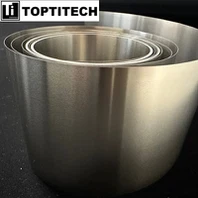 While stainless steel remains the mainstream material for sports watches, there are other metals such as ceramic, 18K gold, platinum, and copper that can be used for watchmaking. Among them, titanium stands out as a well-known material for sports watches. Although it entered the watchmaking industry relatively late, around the 1970s to 1980s, it has gained popularity among watch brands. Titanium is a novel material often associated with the "space age," highly valued in the aerospace and aviation industries. It also finds applications in medical devices and sports watches. While titanium is not scarce, its extraction process is slow and costly, contributing to its expensive price tag. For many years, the high cost has limited titanium's use in military and aviation fields.
While stainless steel remains the mainstream material for sports watches, there are other metals such as ceramic, 18K gold, platinum, and copper that can be used for watchmaking. Among them, titanium stands out as a well-known material for sports watches. Although it entered the watchmaking industry relatively late, around the 1970s to 1980s, it has gained popularity among watch brands. Titanium is a novel material often associated with the "space age," highly valued in the aerospace and aviation industries. It also finds applications in medical devices and sports watches. While titanium is not scarce, its extraction process is slow and costly, contributing to its expensive price tag. For many years, the high cost has limited titanium's use in military and aviation fields.
In the realm of watchmaking, titanium offers several advantages over stainless steel. It is lighter and more corrosion-resistant. Although the number of titanium watches is still relatively small compared to stainless steel, they are becoming increasingly prevalent.
Titanium possesses several characteristics that contribute to its industrial and commercial value:
Lightweight:
Titanium has a lower density than stainless steel (approximately 4.5g/cm3 compared to 8g/cm3), making titanium watches feel lighter when worn, especially noticeable in the thicker cases of dive watches.
High Strength and Resistance:
Despite its lighter weight and lower density, titanium exhibits exceptional strength. For instance, Grade 5 titanium can achieve a strength of 1000MPa, five times that of stainless steel.
Skin-Friendly:
Some individuals may experience allergies to the nickel present in stainless steel. However, titanium does not contain nickel, making it less likely to cause allergic reactions. The natural oxide layer on the surface of titanium also contributes to wearer comfort, providing peace of mind.
Corrosion Resistance:
While stainless steel has made significant strides in corrosion resistance, titanium possesses inherent resistance that surpasses it. It is highly resistant to corrosion, and it takes extreme conditions, such as immersion in strong acids like nitric acid, to cause any significant damage. Hence, it is common to see titanium watches marketed for their suitability in saltwater environments, as they can withstand extended exposure without corroding.
Low Thermal Conductivity:
While thermal conductivity may not seem directly relevant to wearing a watch, consider the scenarios of putting on a metal bracelet watch on a cold winter morning or a hot watch on a scorching day. Titanium's low thermal conductivity mitigates the uncomfortable cold or heat sensations, enhancing wearer comfort.




